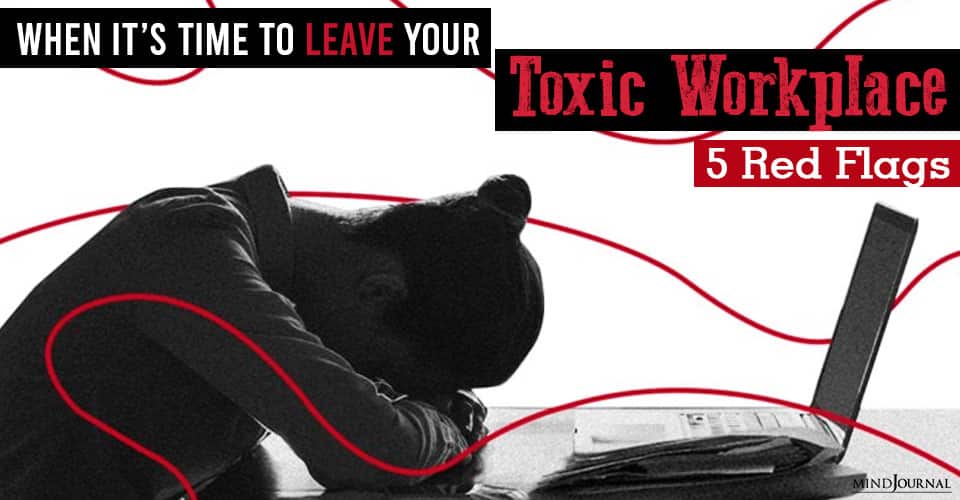Many of us feel overwhelmed after a long week of work and may even want to quit our jobs altogether, but where’s the line between a typical workplace and one that negatively affects your mental health? Toxic workplaces exist in every field, and they may be easy to justify while you’re working in them, but there are plenty of warning signs that your workplace is harming you.
Here’re 5 Signs That Say To Quit Your Toxic Workplace:
If you recognize these red flags, know that leaving is a hard choice but also a decision that will make your mental health so much better.
1. Do Your Manager’s Expectations Exceed Your Productivity Level?
Managers who deliberately cram 10 to 12 hours of work into an eight-hour workday aren’t managers worth leading a company. If your supervisor berates your “lack of productivity,” but you and your coworkers can’t ever seem to finish projects on schedule, then your workplace is likely taking advantage of you.
If you’re constantly told to finish every task assigned to you by the end of the day but are forced to leave when you have hours of work left, you’re not alone — but you are working at a company that doesn’t value your time or effort. It’s OK to walk away from companies that gaslight you into believing you’re unproductive when you’re actually doing all you can — you’re a good employee and deserve a workplace that appreciates your ability to finish a (reasonable) workload.
Related: 10 Questions To Know If You Should Support Your Leader Or Manager
2. Does Your Company’s Culture Feel Exclusive?
Toxic workplaces can be full of hierarchies, favoritism, and even nepotism, and they may require you to fit a certain image in order to keep your job. If you constantly churn out higher-quality work than some of your fellow employees but see lower-performing, less team-oriented coworkers receiving promotions instead of you, you may want to consider leaving and looking for a job elsewhere.
Companies that damage employees’ mental health also often feel exclusive and unsafe — if you’re never invited to company events or constantly hear racist, sexist or heterosexist comments at the office, you deserve to find a workplace that doesn’t put you or others down for being yourselves. There are companies out there that will welcome you with open arms and treat you as an equal, and when you find one, it may drastically improve your mental health and self-confidence.
3. Do You Constantly Feel Micromanaged?
Workplaces that can harm your mental health are usually chock-full of bosses who constantly criticize their employees’ work and talk down to workers. If your higher-ups constantly check in on your work and insist you’re doing your job incorrectly, even when you’re following their instructions down to the letter, it’s easy to feel defeated, anxious, and emotionally numb during the workday.
Good workplaces trust that they’ve trained their employees well enough to do their jobs without constant criticism or interference, so if your workplace doesn’t give you space to do your work well, it may be time to leave. Not every employer micromanages and leaving your current company to find a company that manages employees without berating and controlling them is hard but can easily relieve much of your stress.
Related: 9 Ways To Develop More Conscientious Interactions At Workplace
4. Does Your Employer Withhold Pay?
One of the clearest signs of a toxic workplace is workers almost never receiving their pay on time. If you’re told that you’re paid weekly or every other week but your paychecks are never sent out on time, your workplace is being dishonest — and not having reliable access to your pay can be extremely stressful.
Also, if you check your paychecks and constantly notice that you’re being paid less than you earned for that time period, don’t be afraid to look elsewhere for an employer that pays you honestly and in a timely manner.
Being in that position can make leaving your workplace feel like a losing battle, but you may be far happier — and better off financially — if you find a job that properly compensates you for your work.
Related: What Is Your Attachment Style At Work? QUIZ
5. Does Your Company Refuse To Accommodate Your Health And Accessibility Needs?
If you’re living with health conditions and request reasonable workplace accommodations, your company is required by law to honor them. Sadly, though, too many companies balk at implementing accommodations for their disabled, mentally ill, and chronically ill employees. If you disclose your health conditions and offer up ways that your company can help you work with your condition, but they refuse to provide the accommodations you need to succeed, they’re showing the true character of their company.
Any employer who diminishes your medical needs5t accuses you of “faking” your condition, or refuses to make appropriate accommodations to help you work more efficiently with your disability or illness can contribute to your symptom flare-ups and stress levels. Your medical condition isn’t “too much” to accommodate — and you deserve to work at an employer who genuinely accepts your needs and wants to see you succeed.
Feel free to share this article with anyone who you may think will find it valuable and helpful.
Written by: Kelly Douglas Originally appeared on: The Mighty Republished with permission











Leave a Reply